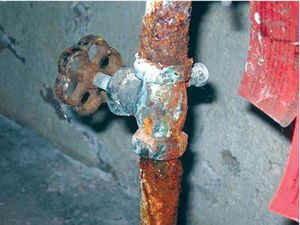- Walk-in Traffic is by Appointment Only - More Details
Procrastination of Leaks Can Be Very Costly
To Add On Or Not To Add On
June 13, 2013
5 Easy Cleaning Tips for Your Home Exterior
June 23, 2013
1. Rust – Rusty pipes often will give up structural integrity to form small leaks that will slowly drip down walls and onto the foundation. While a single drip at a time doesn’t seem like cause for alarm, keep in mind that there are structural concerns for the home as well as physical health that could be in jeopardy with each droplet. Water can easily rot the drywall and wood across supporting braces, deteriorate concrete footings, and can be a breeding ground for a variety of molds of all kinds. This could be exceptionally dangerous for those who are allergic to these molds. Your home could be hurting you severely without you realizing.
2. Accumulating Dampness – If you notice areas of your wall becoming saggy or showing signs of water damage, procrastinating a $30 fix could wind up costing you $3,000 in home damages as time continues. As the materials that go into most homes can be negatively impacted by the effects of water, you could be sitting on a disaster waiting to happen. Over time, that slow leak could become worse introducing even more water into the walls and other items such as power sockets.
3. Valves – Many people don’t realize that even a shutoff valve can spring a slight leak. If a corrosive instance occurs such as rust, your means to shut of the water to your home can become compromised. The effect of this situation is that a severe leak could form and you’d have to contact the city in order to shut off the water from its own valve. This could take up to an hour or so depending on the area you live in. In the meantime, your home can become instantly flooded as gallons of water begin filling up the residence. Now, you have to pay the city for the shutoff, the hardware store for the materials to fix the leak, and the gallons of water that flooded your home. All because you didn’t want to spend an afternoon fixing a small leak in the shutoff valve.
4. Seized Valves – Rust just doesn’t make holes in pipes to create leaks. More commonly, it will also prevent you from turning the shutoff valves. In an emergency, trying to force the rust-frozen valve to turn could cause further damage. If you notice your valves are becoming corroded by either rust or hard water deposits, it would be in your best interest to deal with those problems immediately. Many products such as “CLR” and the like can prevent this future problem.
If something becomes damaged within the home, it’s always best to deal with the situation immediately. Procrastination or “duct-tape fixes” won’t save your home from future damage and/or decay. It’s worth the extra effort and time it takes to fix something properly than to deal with a severe problem later on.
This is a guest post by Liz Nelson from WhiteFence.com. She is a freelance writer and blogger from Houston. Questions and comments can be sent to: liznelson17 @ gmail.com.




